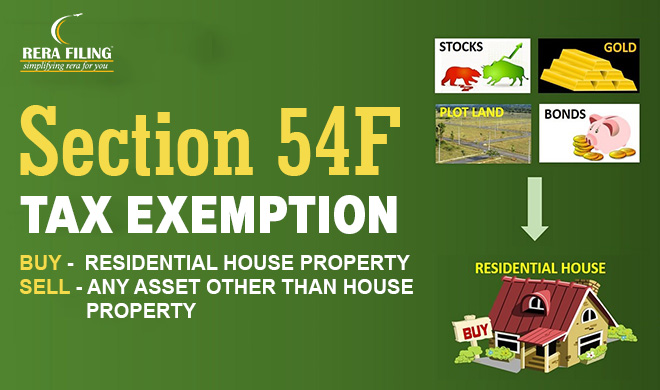Section 54F of Income Tax Act, 1961

- Thursday 25th April 2019
- Author: Shreya Uppal
Highlights
As per the provisions of Section 54F of Income Tax Act, 1961, exemption of Capital Gain is available in case of transfer of any long term capital asset other than residential house
The exemption is available Only to Individual and HUF (Hindu Undivided Family)
Capital gain which has arisen on transfer of any long term capital asset must be invested in Residential House.
Exemption under section 54F= Long Term Capital Gain* Amount Re-invested/ Net Consideration
The Income Tax Act, 1961 provides various exemptions against Long Term Capital Gain and Short Term Capital Gain subject to various conditions regarding their transferability and holding period. The definition of Capital Asset is provided under section 2(14) of the Income Tax Act, 1961 which are categorised on the basis of time period of ownership as Long Term Capital Assets and Short Term Capital Assets . Generally, as per section 2(42A) of the Income Tax Act, 1961, Long term capital asset means a capital asset held by an assessee for more than 36 months immediately preceding the date of its transfer, but with effect from Assessment Year 18-19, the period of holding in case of immovable property is reduced from 36 months to 24 months, otherwise it will be categorised as short term capital asset.
- As per the provisions of Section 54F of Income Tax Act, 1961, exemption of Capital Gain is available in case of transfer of any long term capital asset other than residential house.
- The exemption is available Only to Individual and HUF (Hindu Undivided Family).
- Capital gain which has arisen on transfer of any long term capital asset must be invested in Residential House.
- Net Consideration arisen on account of transfer of long term capital assets has been invested as follows:
- It has been Re-invested in Purchase of One Residential house within a period of 1 year Before the Date of Transfer, Or
- It has been Re-invested in Purchase of One Residential house within a period of 2 years After the Date of Transfer, Or
- It has been Re-invested in Construction of One Residential house in India within a period of 3 years From the Date of Transfer
For the purpose of this section Net Consideration can be defined as full value of consideration received on account of transfer of the capital assets as reduced by expenditure incurred wholly and exclusively in connection with such transfer.
Net Consideration= Full Value (-) Expenditure
A. Circumstances under which exemption under section 54F is not available:
1. As on the date of transfer of the original assets, the assessee owns more than one residential house property other than the new asset.
2. The assessee purchases any residential house, other than the new asset, within a period of one year from the date of transfer of the original asset.
3. The assessee constructs any residential house, other than the new asset, within a period of three years after the date of transfer of the original asset.
B. How to calculate amount of the deduction available under this section?
Exemption under section 54F= Long Term Capital Gain* Amount Re-invested/ Net Consideration
Example: LTCG on transfer of any long term capital asset= Rs. 10,00,000
Net Consideration= Rs. 50 Lakhs
Re-invested amount= Rs. 30 Lakhs
Exemption u/s 54F= (10,00,000/50,00,000)*30,00,000= Rs. 6 Lakhs
Therefore, LTCG taxable= Rs. 10 lakhs (-) Rs. 6 Lakhs= Rs. 4 Lakhs
In case full amount of net consideration is invested in purchase/construction of residential house, then the full amount of LTCG would be exempted u/s 54F.
A. Capital Gain Deposit Account Scheme
- In case the net consideration is not re-invested within the last date of filing of return of income under section 139, then, the amount should be deposited in capital gain deposit account scheme. The amount so deposited in capital gain deposit account scheme should be used for purchase / construction of the residential house within the specified period.
- In case the amount as deposited in capital gain deposit account scheme is not utilized for wholly or partly within the specified period for purchase or construction, as the case may be, then, in such case on expiry of the period, the unutilized amount shall be treated as capital gain.
(D) Consequence on Transfer of New Asset
In case there is a transfer of new purchased residential house or constructed residential house before expiry of a period of 3 years of its purchase or construction, as the case may be, then, the capital gain exempted under section 54F shall be taxable as long term capital gain of the previous year in which the new asset is transferred.
Therefore the intention behind introducing this provision is to encourage investment in residential property for the needy one, so that every person can afford good housing facilities and not to circulate money for sometime in order to avail exemption and then again circulating money in the market.
More Articles
- Online Listing Tips for Real Estate Agents
- How to start a Real Estate business in India - a complete guide !
- Renting Vs Buying property - How will you decide?
- What you should do in Property Management services
- Home Loan Insurance
- How to choose your builder?
- How to ensure fire safety in your home!
- Tips To Keep In Mind While Taking A Home On Rent
- Importance of Home Security
- How to plan your property budget?
- Leased vs. Purchased vs. Co-Working Office Spaces
- Easy Tips to Build an Eco Friendly Home
- Sample Flat - A Trick by a Builder?
- How to have a Beautiful Guest Room? Impress your Guests with these Guest Room Ideas..
- Understanding MCLR and its Effects on Home Loans
- 5 simple ways to close a real estate deal
- Is it worth to buy property near an airport ?
- Home loan tax benefit
- How to be successful in business as an introvert
- Cost effective home decor ideas
- What to Be-Paying Guest or a Tenant??
- Complete guide to start your small business
- Sports township- New trend in India
- Online Listing Tips for Real Estate Agents
- Understanding Floor Area Ratio- FAR
- Town and Country Planning | Meaning and Importance
- Checklist of Important Property Documents- All You Need to Know
- Role of CREDAI in real estate
Copyright © 2023 RERA Filing. All rights reserved.
 Rera
Act
Rera
Act
 Maharashtra
Maharashtra Karnataka
Karnataka Andhra Pradesh
Andhra Pradesh Uttar Pradesh
Uttar Pradesh